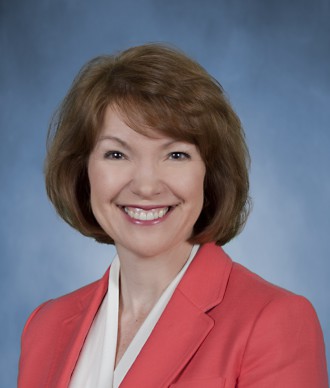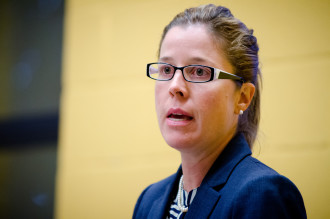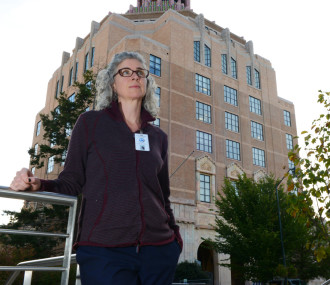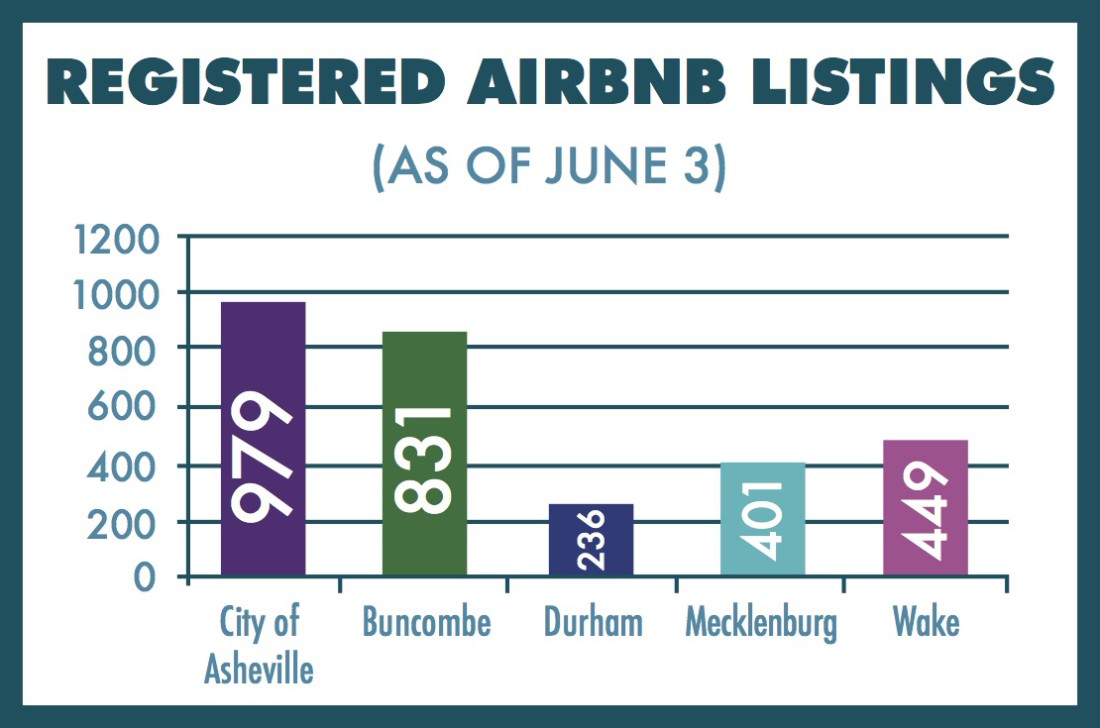Asheville’s status as a top tourist destination has sparked a boom in vacation lodging, including short-term rentals and homestays as well as hotels. Amid considerable controversy, local listings on Airbnb have skyrocketed in recent months, and on June 1, the online rental service began collecting taxes totaling 11 percent on Buncombe County rentals of less than 90 days. The total charge comprises 7 percent state and local sales taxes and a 4 percent occupancy tax.
“The law has not been very clear on what the process would be for the collection and remittance of that tax” by those offering short-term rentals and homestays, says Lynn Minges, president and CEO of the N.C. Restaurant & Lodging Association.
Airbnb has been negotiating with the association for months, she explains, adding that her organization, local businesses, the online service and its member hosts have “all worked together to come up with a workable solution.” Calling it “a national issue that we as a statewide lodging association have been following very closely,” Minges says Airbnb hosts’ failure to collect these taxes gave them an unfair advantage over bed-and-breakfasts and hotels.
Short-term rentals (defined as those involving non-owner-occupied residential units for less than 30 days ) and homestays (people renting out a portion of their residence for less than 30 days) are illegal in most parts of the Asheville. Nonetheless, as of June 3, there were 831 Airbnb rentals listed with a Buncombe County search tag and 979 rentals listed with an Asheville tag. Buncombe County allows vacation rentals in all areas that don’t have municipal zoning, with some restrictions.

“I think there’s been a lot of opportunity for short-term rentals in Asheville because it’s a popular place to visit,” says Stephanie Brown, executive director of the Asheville Convention and Visitors Bureau. “The Tourism Development Authority has been very successful over the course of 30 years of building a really significant tourism economy, and many people are sharing in that.” The bureau hasn’t taken an official stand on such rentals.
Proponents say they provide affordable lodging for visitors and an income stream for property owners; opponents say they will exacerbate the city’s affordable housing crisis and change the character of neighborhoods.
Meanwhile, Asheville wants to tighten its standards and beef up enforcement. City staff are developing recommendations that could come before the Planning and Zoning Commission next month, says Development Services Director Shannon Tuch. The fine for violations, currently $100 per day, will be increased “enough to discourage people who just prefer to pay the fine versus stopping the activity,” she notes.
A national trend
To put Asheville’s numbers in perspective, Mecklenburg County, which has a population four times that of Buncombe, has 401 rentals listed on Airbnb. Granted, Charlotte’s economy is much less dependent on tourism, but Santa Fe, New Mexico, a comparable-size city that also draws a lot of tourists, lists just 518 such rentals.
“I’m assuming that we are just part of a national trend,” says Asheville Mayor Esther Manheimer.
A study of the short-term rental market commissioned by City Council last year found that as of December, there were 627 Airbnb rentals in the city. Since then, Asheville residents have added about 60 Airbnb rentals per month.
But while Airbnb’s popularity has grown, cities across the nation are struggling with how to regulate the impact of those short-term rentals and homestays.
Enforcement of current regulations is complaint-driven, though City Council has requested an additional full-time staff position to support a more proactive approach to enforcement, says Tuch.

Currently, city property owners wanting to offer short-term rentals or homestays must register and pay a fee. Applications and fee information are available through the city’s Development Services Department.
Short-term rentals are currently allowed in all areas of the city that are not zoned residential, including downtown. “But if you want to rent out a whole house in a neighborhood that’s currently zoned residential, which most of them are, then that is not permitted,” says Manheimer.
Homeowners, notes Tuch, can find specific information on their property’s zoning status by checking the geographic information system data on the city and county websites.
Proposed regulations
Last month, City Council discussed changing the rules concerning short-term rentals and homestays. Tuch says the city has an idea of where it wants to go, but staff are still researching and drafting the new standards.
“A lot of different cities around the country have done this in all different ways,” notes Manheimer. “Some of them have spacing requirements, where you can have one rental but you can’t have another one unless it’s so many feet away. Other ways cities are regulating short-term rentals is requiring them to provide on-site parking for two cars or go through inspections.”

For homestays, Council members recommended changes such as eliminating housing size requirements and reducing or eliminating parking requirements. The city is also considering inspections of the space to be rented.
One city resident who declined to be named says she lists her home on Airbnb to supplement her income. She feels home inspections would infringe on her property rights but says that if the city did decide to allow short-term rentals in residential areas, she’d comply with any regulations that were put in place. She also notes that property owners might not realize they’re breaking any laws, particularly in neighborhoods with a mix of homes and businesses.
During their May 12 meeting, City Council members voiced opinions ranging from banning short-term rentals in all areas of the city to leaving the current regulations in place and enforcing them more effectively.
Asheville real estate broker and investor David Rodgers opposes both short-term rentals and homestays in residential areas.
“We have a housing crisis in Asheville,” he points out. “We don’t have enough rentals or houses for people to buy, and every unit that’s used as an STR takes one more off the market.”
At a minimum, says Rodgers, short-term rentals shouldn’t be allowed in residential areas, because doing so would increase long-term rental rates and reduce the number of long-term rentals available.
“There will be less housing for people who live and work in Asheville,” he predicts. People who want to rent out a portion of their home, argues Rodgers, could turn it into a duplex (i.e., live in one part and rent the rest) or get a roommate.
Emily Flynn McIntosh, co-owner of A Bed of Roses Bed & Breakfast and president of the Asheville Bed & Breakfast Association, says her organization doesn’t think short-term rental of entire homes is appropriate in residential neighborhoods but does support easing square footage requirements.
“We agree that minor adjustments to the homestay option could be made without substantial concern,” the association said in a 2014 position paper on the issue.
Fair share
On its public policy blog, Airbnb says the sales tax is being collected statewide; the 11 percent rate also applies in Durham, Mecklenburg and Wake counties. “This announcement comes after months of work between Airbnb and authorities across North Carolina on how to make it simpler for local residents to follow the rules and pay their fair share, ” the blog notes, adding, “We are proud to work with local leaders to implement this initiative.”
“Airbnb picked those four counties because that’s where they say they have the most inventory in North Carolina,” explains Jennifer Durrett, internal auditor for the Buncombe County Finance Department.
Statewide collections satisfy one of the recommendations in the Bed & Breakfast Association’s position paper. The organization is also calling for occupancy limits, annual inspections and proof of insurance.
“A level playing field for the full range of legally operating lodging options within these residential locations should be established by the city of Asheville,” the position paper states.
That’s exactly what the N.C. Restaurant & Lodging Association hoped to achieve when it began working with Airbnb, says Minges. Tax collections aside, though, counties also need to deal with issues such as building and zoning codes and parking, she continues.
Tuch, meanwhile, says city staff are working on drafting new standards in time for the July 16 Planning and Zoning Commission meeting.
P&Z will review them and make a recommendation to City Council, which could make a final decision by Aug. 11, depending on the commission’s time frame, says Tuch.




If the city wants to beef up regulation, I’d rather they do so with long term rentals than Airbnb’s. Landlords get away with renting terrible properties for far too much money in this area and due to the lack of renter’s rights, there is little recourse for renters. It’s deplorable.
Agreed!
Crack down on the 21st century. Carolina politicians are a bunch of losers